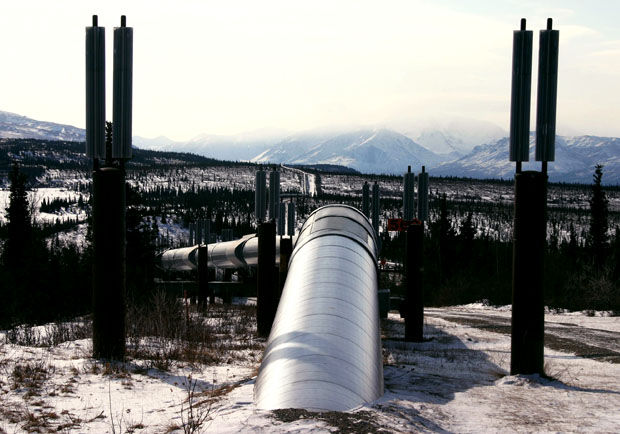Fragile environments should benefit from falling gas prices
The Trans-Alaska oil pipeline between Delta and Glenallen, Alaska, as seen March 22, 2008. President Obama announced plans to deem the Arctic National Wildlife Refuge protected wilderness, which would protect it from oil and gas drilling.
January 29, 2015
On Sunday, Obama announced plans to designate 12 million acres of Alaska’s Arctic National Wildlife Refuge as protected wilderness.
The New Year heralded astonishingly low gas prices, putting oil exploration and production on the back burner. This allows the U.S. government to focus on more important matters, like protecting a fragile environment from future drilling damage.
The plan ensures that a large portion of northeast Alaska receives the title of wilderness (the highest level of environmental protection available) and remains pristine, i.e., out of the hands of greedy, money-hungry oil exploration.
However, it is important to not think of the area in terms of a congressional bill or a governmental proposal, but rather a vulnerable habitat teeming with life in need of protection. The Alaskan Arctic National Wildlife Refuge is a wonderland of nature and beauty, not a tool of partisan government.
The roughly 30,000 square-mile refuge is home to 37 species of land mammals, eight marine mammals, 42 fish species and more than 200 migratory bird species, as recorded by the habitat conservation program Defenders of Wildlife.
The damage to these populations should oil corporations ravage their homes and migratory dwellings is immense. However, we can be sure the already shrinking numbers of polar bears, beluga whales and costal Pacific walruses will further deplete into theoretical extinction.
Only Congress has the power to designate an area as wilderness. Unfortunately, Republican Congress shows little sign of passing the bill – no doubt fueled by an adopted partiality toward the right-wing need for oil and natural gas.
When an area is deemed a wilderness, it is protected from logging, mining, road building, off-road-vehicle use, industrial development and, most importantly, oil and gas drilling.
In an article by the Washington Post, Alaskan Gov. Bill Walker stated that an increase in oil production would significantly improve the Alaskan economy in both the short and long term.
Alaskan Sens. Lisa Murkowski and Dan Sullivan agree with Gov. Walker and completely reject the plan. Murkowski stated she would “fight back with every resource at our disposal,” in an NPR article.
The unfortunate matter at hand is that the current surplus of oil does not seem to be fazing the representatives from Alaska, not to mention their hard-headed mindset.
Environmental protection is something that should be at the forefront of our minds. The rich landscape and purified essence of nature were present long before it was ravaged by industry.
New energy technologies are abundant, and the rejection of Obama’s plan would not only be a step in the wrong direction, but a harsh blow to environmental protection.





















